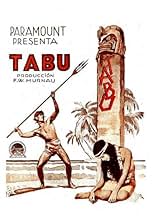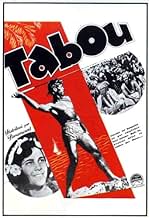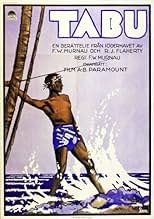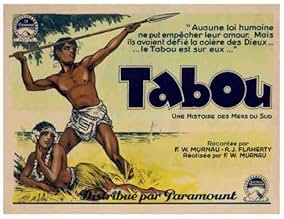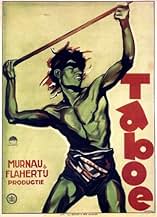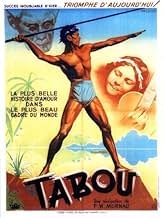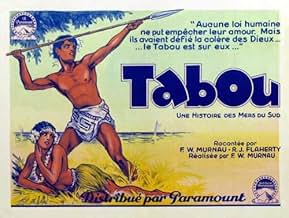Aggiungi una trama nella tua linguaOn the South Pacific island of Bora Bora, a young couple's love is threatened when the tribal chief declares the girl a sacred virgin.On the South Pacific island of Bora Bora, a young couple's love is threatened when the tribal chief declares the girl a sacred virgin.On the South Pacific island of Bora Bora, a young couple's love is threatened when the tribal chief declares the girl a sacred virgin.
- Regia
- Sceneggiatura
- Star
- Vincitore di 1 Oscar
- 4 vittorie totali
- The Girl
- (as Reri)
- The Policeman
- (as Jean)
- The Businessman
- (non citato nei titoli originali)
- The Captain
- (non citato nei titoli originali)
- Boys Friend
- (non citato nei titoli originali)
Recensioni in evidenza
The actors are real Polynesians and their ceremonies and rituals are faithfully captured, and interwoven with a tragic love story. The cinematography deservedly won an Oscar - it is truly beautiful. Murnau, away from his usual studio sets, manages to create the same sense of danger using natural light - especially moonlight - and real locations.
The performances are very strong - especially Chevalier as the girl, and the old man is as scary as Nosferatu as he haunts her dreams at night.
Sadly this was Murnau's last film - he died in a car crash just before the premiere. It is a little dramatically uneven, and certainly not the masterpiece that "Sunrise" is, but it is still very worthwhile.
This one has one thing distinguishing itself from the others - the cast is all actually Polynesian, or partly so (sorry Dorothy). It does bring in the common troubles of indigenous peoples: wanting to escape their stifling tribal atmosphere, they have a hard time coping with the outside world's currency economy and alcoholic drink. The movie eschews the Hollywood ending. Anne Chevalier is a treat, and a climatic moment late in the movie is directed for maximum shock.
The best spear-fisherman on Bora Bora is a handsome young man billed simply as The Boy (Matahi). His legendary status and unparalleled skill makes him popular amongst the islanders, and soon he has caught the eye of The Girl (Reri - who went on to star on Broadway as Anne Chevalier). They romance each other, but their affair is soon halted by the arrival of emissary The Old Warrior (Hitu), who proclaims Reri as the sacred maiden. She is 'tabu', and cannot be looked upon by any man unless he wishes the punishment of death. The couple brave storm and sea to escape, an arrive in a French-colonised island, where Matahi start work as a pearl diver. But their happiness is fleeting, and Reri is soon haunted by the image of Hitu, terrified she may have angered the gods.
The plot is hardly anything new, but Floyd Crosby's Oscar-winning cinematography makes Tabu more socially aware that the film may have you believe. The subtle yet crucial involvement of the French colonists, finding amusement at Matahi's lack of understanding regarding money and material wealth, is a clear swipe at the creeping of Western civilisation. Bora Bora won't stay pure for much longer. And that adds a gravitas to Matahi and Reri's plight - not only is their romance doomed, but so are their traditions and society. It is one of the last great silent films, a reminder that sound can be an unnecessary distraction, and that picture's can sometimes genuinely speak louder than words.
www.the-wrath-of-blog.blogspot.com
Although no members of the cast were professional actors, the performances by Matahi (as a young pearl fisherman) and Reri (as the `tabu' island girl) are moving. More than 70 years after its release, `Tabu' remains essential viewing, and UCLA's restoration of this classic has been a highlight of the schedule of new DVD releases in 2002. In fact, the film's luxurious black-and-white cinematography garnered cameraman Floyd Crosby an Oscar. DVD extras include audio commentary by UCLA Film Professor Janet Bergstrom; outtake footage; theatrical trailer; still gallery; short film titled `Reri in New York.'
Lo sapevi?
- QuizProducer/director/co-writer F.W. Murnau died in a car accident a few days after starting work on the music for this film. It had its New York premiere a week later.
- Citazioni
The Girl: [writing a goodbye letter] I must go. Hitu is here and waits for me. You will die if I do not obey. I will go so that you may live. The tabu is upon us. I have been so happy with you far more than I deserved. The love you have given me, I will keep to the last beat of my heart. Across the great waters, I will come to you in your dreams when the moon spreads its path on the sea. Farewell.
- ConnessioniEdited into Treibjagd in der Südsee (1940)
I più visti
- How long is Tabu: A Story of the South Seas?Powered by Alexa
Dettagli
Botteghino
- Budget
- 150.000 USD (previsto)
- Tempo di esecuzione1 ora 26 minuti
- Mix di suoni
Contribuisci a questa pagina



